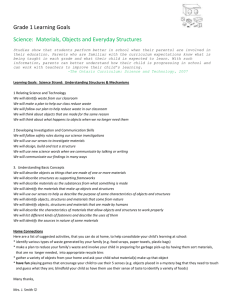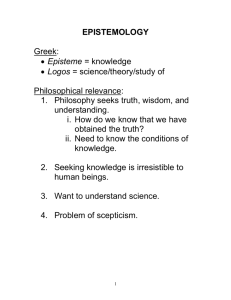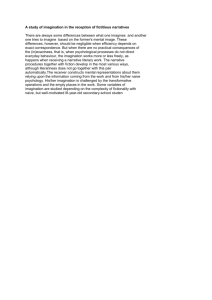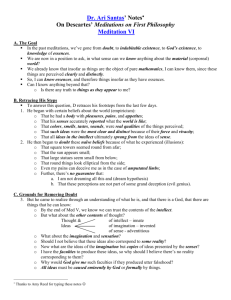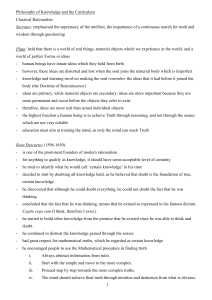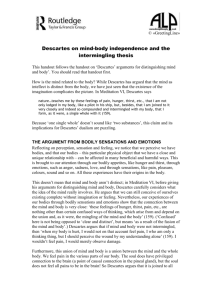Précis of Meditation 6 (The Existence of Material Things, and the
advertisement
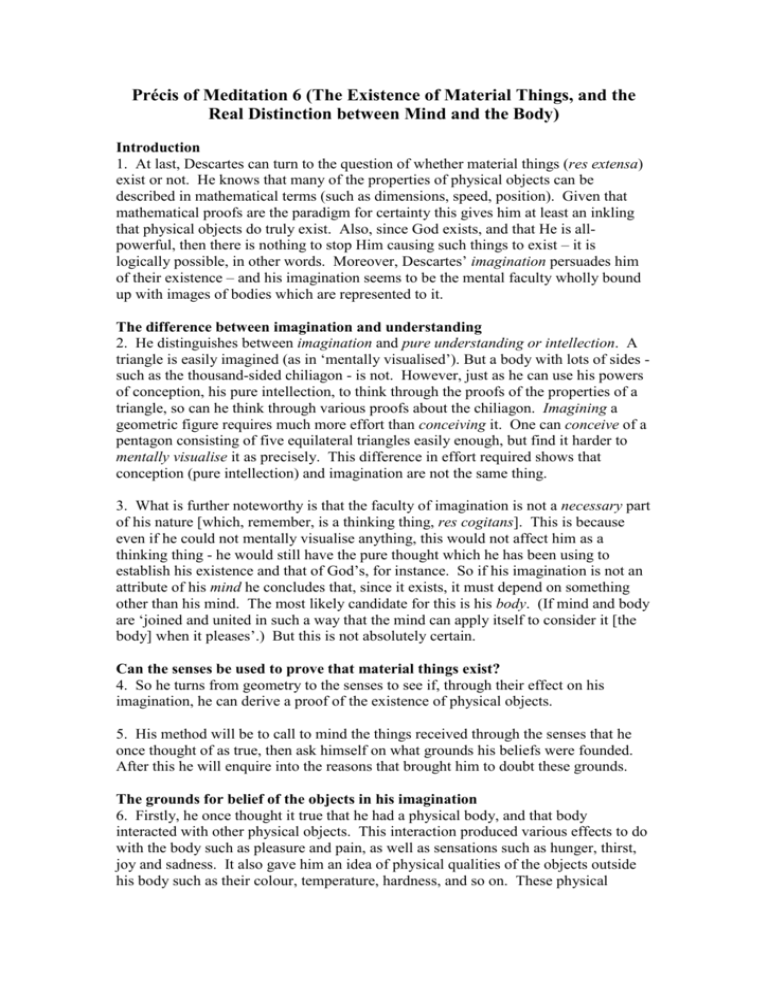
Précis of Meditation 6 (The Existence of Material Things, and the Real Distinction between Mind and the Body) Introduction 1. At last, Descartes can turn to the question of whether material things (res extensa) exist or not. He knows that many of the properties of physical objects can be described in mathematical terms (such as dimensions, speed, position). Given that mathematical proofs are the paradigm for certainty this gives him at least an inkling that physical objects do truly exist. Also, since God exists, and that He is allpowerful, then there is nothing to stop Him causing such things to exist – it is logically possible, in other words. Moreover, Descartes’ imagination persuades him of their existence – and his imagination seems to be the mental faculty wholly bound up with images of bodies which are represented to it. The difference between imagination and understanding 2. He distinguishes between imagination and pure understanding or intellection. A triangle is easily imagined (as in ‘mentally visualised’). But a body with lots of sides such as the thousand-sided chiliagon - is not. However, just as he can use his powers of conception, his pure intellection, to think through the proofs of the properties of a triangle, so can he think through various proofs about the chiliagon. Imagining a geometric figure requires much more effort than conceiving it. One can conceive of a pentagon consisting of five equilateral triangles easily enough, but find it harder to mentally visualise it as precisely. This difference in effort required shows that conception (pure intellection) and imagination are not the same thing. 3. What is further noteworthy is that the faculty of imagination is not a necessary part of his nature [which, remember, is a thinking thing, res cogitans]. This is because even if he could not mentally visualise anything, this would not affect him as a thinking thing - he would still have the pure thought which he has been using to establish his existence and that of God’s, for instance. So if his imagination is not an attribute of his mind he concludes that, since it exists, it must depend on something other than his mind. The most likely candidate for this is his body. (If mind and body are ‘joined and united in such a way that the mind can apply itself to consider it [the body] when it pleases’.) But this is not absolutely certain. Can the senses be used to prove that material things exist? 4. So he turns from geometry to the senses to see if, through their effect on his imagination, he can derive a proof of the existence of physical objects. 5. His method will be to call to mind the things received through the senses that he once thought of as true, then ask himself on what grounds his beliefs were founded. After this he will enquire into the reasons that brought him to doubt these grounds. The grounds for belief of the objects in his imagination 6. Firstly, he once thought it true that he had a physical body, and that body interacted with other physical objects. This interaction produced various effects to do with the body such as pleasure and pain, as well as sensations such as hunger, thirst, joy and sadness. It also gave him an idea of physical qualities of the objects outside his body such as their colour, temperature, hardness, and so on. These physical qualities allowed him to distinguish between the variety of physical objects including the sky, sea and earth. 7. Considering such qualities carefully, it seemed as though they were impressed on his imagination without, as it were, asking for his mind’s consent. Since the ideas presented to the imagination were more vivid and more distinct than images that he called up himself it seemed the case that they cannot have come from his own mind. (You can look at a table and imagine a pygmy elephant sitting on it. However, the pygmy elephant lacks the qualities of vividness and permanence that the table itself has – and ‘imagining the table away’ is also very hard.) This convinced him before that they must have been caused by objects outside his mind. The immediacy of perception through the senses was what had persuaded him that experience preceded thought. On the natural link between things sensed and the mind’s appreciation of them 8. This was reinforced by the sense of ‘privileged access’ Descartes has to his own body - that his feelings, experiences and sensations were immediately and incorrigibly known to his mind. Why should it be that there are links between things in the imagination and things in the mind - like a pain leading to sadness, or a sensation from the stomach leading to hunger? The only answer he can think of is that it is a natural link. 9. Experience, however, had undermined this natural link: towers that had appeared round from a distance had then, on closer inspection, turned out to be square, for example. The sensation of pain in a phantom limb illustrates that we can even be mistaken about pain. Thus experience of both externally- and internally-prompted sensations had showed that his senses were fallible and therefore open to doubt. He can add to these reasons for doubting the natural link between putative physical objects and the objects of his imagination the possibilities that his senses are being stimulated either as they are in a dream or by being manipulated by some evil demon. Such things brought him to his doubts about trusting his senses to deliver the truth: his nature had led him astray in the past - with only reason pointing him in the right direction. And just because the objects in his imagination appear to him to be completely unwilled by himself, from this he cannot safely conclude they have not been prompted by some part of his mind of which he is unaware. 10. That said, he is getting to know his own mind, and God, better. And though he is not going to rashly accept all that his senses present to his mind, he doesn’t think he should dismiss them wholesale either. On why the mind and the body are two substances 11. He repeats his criterion for truth is ‘clear and distinct perception’ and notes that God can create the things he (Descartes) sees ‘clearly and distinctly’. This is because God is omnipotent [in the philosophical sense of being able to do anything which does not involve a contradiction]. Thus, if he sees (clearly and distinctly) that two things are separate, he can be sure that God can have made them as separate. Now, Descartes knows that he exists and that he is a thinking thing. Not only is he a thinking thing, he knows that he is solely a thinking thing - in other words, his whole nature is just that. On the other hand, he also has a clear and distinct idea of his body which is non-thinking and extended. And this is certainly not a part of his essential nature as a thinking, non-extended thing: he can exist without it. 12. However, he does have the faculties of imagining and sensing but, though these are not essential to his self (the res cogitans) he cannot conceive of them as separate substances in their own right – they are attributes, and attributes must refer to some substance. The same is true for the attributes of extension, movement and the like. Since these attributes involve extension, it is clear that they cannot have to do with the (unextended) mind, i.e. must be in a physical substance rather than a mental one. 13. Furthermore, Descartes has the faculty of perception of objects in his imagination. Since this faculty does not depend on his own mind there must be something else on which it does depend: there must a cause to produce their effect in him. The causative principle is either something which is formal [having the same form as the effect] or eminent [produced by a more perfect thing]. Thus, what produces the things in his imagination (including his sensations) must either be the corresponding reality of the physical world, or be ideas in God’s mind which are transmitted direct into Descartes’ mind. As a non-deceiver, God would not ‘make up’ the idea of physical objects. Nor would He allow some less perfect creature to do this since this would also leave Him open to an accusation of deception. Hence, Descartes can conclude that the objects in the physical world certainly exist. If not all of them, however, certainly those which can be known clearly and distinctly (the subject matter of pure mathematics). [Hence scientific knowledge based on mathematical equations.] 14. With regard to other things such as ‘external’ objects like the sun, or ‘internal’ sensations like pain, Descartes can be confident that he can discover some truth in them. This is because God would not allow him to be deceived without providing him with a faculty for securing the truth. Everything he is taught by nature has some truth in it since Nature (the physical world and Descartes’ mind) must contain truth since it is God’s work. 15. There is nothing more natural to believe than that Descartes has a body that is harmed when he feels pain, needs food and drink when he feels hungry and thirsty so there must be at least some truth in this. 16. His nature tells him that his mind is not sitting in his body like a pilot in a ship, but that there is a more thorough intermingling of the two – so that mind and body ‘compose a single entity. So thorough is this intermingling that it is what gave rise to his previous mistake in not seeing them as separate things. 17. Nature also tells him, through his sense perception, what to approach and what to avoid so as to be comfortable. His senses also tell him that bodies around him vary (even if they do not actually, it seems so to him). 18. But caution must be urged because he has judged rashly in the past - such as in thinking that the heat in a physical object like a fire is of a similar quality to the idea of heat he has in his mind, or thinking that distant objects which look the same size are in fact the same size. 19. Descartes is careful to distinguish the things that nature can teach him from the other things that are in his mind. He knows lots of things by the ‘light of natural reason’ (a phrase he uses that means the same as ‘perceiving something clearly and distinctly’) and these cannot be referred to the body. In other words, he is not going to consider purely intellectual things here. 20. Other things, such as being affected by gravity, are just to do with the body alone. Again, he will not consider these here. What he is going to consider are those things which relate to the combination of mind and body. 21. His sensations (of warmth, pain, etc) are such things and, as mentioned before, these sensations guide him towards living comfortably in terms of avoiding what is not good for him, seeking out what is good for him. However, our nature does not urge us to assume the truth of these sensations. Rather, our understanding is what we must rely on to verify sensations: mind is sovereign to the mind-body combination. Though the latter would tell him that a star and a candle flame are the same size, his mind judges this differently. His sensations on approaching a fire - first feeling heat and then pain - should not persuade his judgment (his mind) that there is pain in the fire just as there is heat in the fire. His judgment in this case tells him there is something in the fire capable of producing both sensations in the body. Further, his judgment tells him that in the absence of any perceptual stimulus (in empty space) he is not right to conclude that the space is, in fact, empty. He is seduced into thinking in this way because of the way the body has been made in such a way as to inform him of what is to be preferred and what avoided by the body and mind together. His problems in the past have stemmed from treating such information about things outside his own mind as infallibly correct. More on our lack of perfection 22. Having dealt with the reason for his judgment being faulty on occasion, Descartes turns to cases where it seems that nature directly deceives him - like not being aware of poison in the food he may find pleasant to eat. If God is good, why is it that what seems natural to us is not the right thing? His first point is that it was not necessary for God to give us perfect discrimination in all senses. Indeed, since we are finite beings we could not have such infinite particular perfections. 23. That said, we can still ask why sick people sometimes ‘naturally’ desire something that harms them? In answer, the first thing he points out is that we must be careful in our terms – it is not that the nature of sick people has ‘gone wrong’. He uses an analogy of two clocks, one of which does not keep good time. This does not mean that, unlike the good time-keeper, it is disobeying nature. Rather, the laws of nature are the same for both clocks. This is the same for people. Their bodies will obey the laws of nature since they are machine-like. If one person gets sick and starts desiring something that will harm them, we might say their ‘nature is corrupted’ but this is using ‘nature’ in a different sense from Descartes’ meaning which is, roughly, natural law. 24. Having said this, Descartes still has to deal with why it is that God allows such things as a man with dropsy (a condition where excess fluid builds up in the body) to be continuously thirsty, thus causing him to drink and hence make things even worse. An apparent digression 25. Descartes begins by pointing out that the mind is a single, indivisible entity whereas the body is not. Even though he has spoken of the different faculties of the mind, such as desiring, feeling, perceiving, and so on, these are not parts of the mind but attributes of it. On the other hand, the body is made up of parts - it can be broken up into smaller bits. This observation reinforces his conclusion of the mind and body being two different things. Back to ‘natural faults’ 26. It is the brain (and perhaps one part of this organ where common sense resides) which gives immediate impressions to the mind. And the brain is a physical body. 27. It is the interconnectedness of the parts of the body can lead to misjudgment. If you are holding one end of a piece of string with your eyes closed, and someone tugs on the string, you have no way of knowing if they have pulled the other end of the string or anywhere in between. This is like, say, the nerve leading from the toe to the brain. A thump on the toe will stimulate the nerve and the brain would interpret this correctly. But stimulate the same nerve anywhere along its length and the brain will still think the toe has been thumped, i.e. be incorrect. This is true for our other senses too. 28. The arrangement of this link from particular body parts to the mind to produce particular sensations is the one most conducive to a comfortable life. Violence to the foot, for instance, warns us to take care. [Descartes believed that motion of something - actual physical displacement - was necessary to make something happen. Thus, nerves had to be moved to allow the fluid in them to move and communicate with the brain.] God could have set man’s nature such that the sensation caused by violent movement of the foot could, instead of informing the mind of foot-pain, have produced a different sensation altogether [a smell of roses, say]. But that would not have helped in keeping the body safe and sound. A further example is the impulse to drink when we are thirsty - this too helps bodily well-being. 29. It is because the body is arranged to maintain its well-being that it cannot help sometimes giving the mind faulty information. Since the body delivering our sensations is extended, it will always be possible (like pulling the string at various points simulated being pulled at the other end) for mistakes to be made. God cannot make the extended unextended since this is logically impossible. Therefore, He cannot be accused of our faulty sensations. Better that we are occasionally deceived when ill (with dropsy, or suffering pain from a ‘phantom limb’) than have the possibility of always being deceived when we are well [by not having such nerves or feelings]. Back to the real world 30. This is a helpful insight: his senses are usually reliable in telling him what is good or what is harmful for his body. And if he uses more than one of his senses in examining the physical world, he is less likely to be wrong about it. His memory of how things are will help here too - and, best of all, he has his understanding which will allow him to sort through the information looking for errors. Happily, now he knows he can trust his senses, he can reject the doubt about whether he is just dreaming his life. This is because dreams are manifestly different from real life: dreams lack the coherence which memory brings to our awareness of reality; they are disjointed and irrational whereas reality is not. Together, senses, memory and understanding can deliver the truth so long as they are coherent. However, the demands of life mean that we sometimes have to act before thinking carefully. And when we do this, we are prone to error. This ‘infirmity and weakness’ is in our nature.


